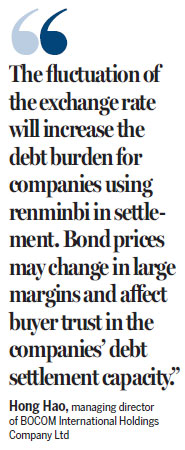Kaisa effect hurts overseas appeal of mainland issuers
Updated: 2015-02-11 09:30
By Yang Ziman(HK Edition)
|
|||||||||
|
The potential problems of Chinese mainland real estate companies are giving overseas investors pause in buying their offshore bonds. Bloomberg Photo |
Kaisa Group Holdings Ltd's failure to make a coupon payment on its US dollar-denominated bonds has greatly dimmed the overseas appeal of bonds issued by Chinese mainland real estate companies, experts believe.
Shenzhen-based developer Kaisa failed to pay about $23 million in interest on its 2020 bonds due on Jan 8, marking the first major sign of financial woes at a rated Chinese developer since 2009. It was also hit by a block on sales approval in Shenzhen for likely links with Jiang Zunyu, the former Party chief of the city's politics and law committee who is being investigated for corruption.
Kaisa has since made the coupon payment within the 30-day grace period ending Feb 7, and news of a buyout offer by fellow developer Sunac China Holdings Ltd has sent Kaisa's bond prices soaring, but the jitters for mainland developers' bonds remain very real.
Moody's Investors Service has downgraded Kaisa Group's corporate family and senior unsecured debt ratings to Ca-negative from Caa3, in the fourth such move since December. According to Moody's report on the consequences of the missed payment, Kaisa's financial troubles will increase risks for mainland developers.

"We expect Chinese developers' near-term access to offshore funding to weaken and offshore funding costs to increase over the coming months, potentially raising the sector's liquidity risk and causing interest coverage ratios to deteriorate," according to the Moody's report.
Mainland developers' offshore funding costs, already under upward pressure due to an anticipated interest-rate increase by the US Federal Reserve later this year, will likely rise further due to the higher risk premium demanded from investors and financiers.
"We expect the risk premium on offshore debt to remain elevated over the coming months as the (coupon) incident underscores the subordinated positions of offshore creditors with respect to claims on onshore assets," the report added.
Glorious Property Holdings Ltd (rated Caa1 negative by Moody's) and Hopson Development Holdings Ltd (rated B3 negative by Moody's) face the highest refinancing risks due to their weak sales performance and large amount of short-term debt, according to the report.
Shenzhen-based Centaline Strategic Management Ltd showed a significant drop in offshore funding by mainland real estate companies. In January, only seven companies announced overseas financing plans, which totaled 15.8 billion yuan ($2.5 billion) - down 73 percent from 60 billion yuan in the same period last year from 21 companies.
"Being warned of the potential risks in Chinese real estate companies, overseas investors have become reluctant to buy their offshore bonds," said Hong Hao, managing director of BOCOM International Holdings Company Ltd. "Moreover, many property developers have already issued a lot of bonds overseas. The pressure of making the payment at maturity is already very high."
The depreciation of the renminbi is another factor hampering mainland real estate companies' motivation for offshore funding.

"The fluctuation of the exchange rate will increase the debt burden for companies using renminbi in settlement. Bond prices may change in large margins and affect buyer trust in the companies' debt settlement capacity," said Hong.
The inter-bank spot exchange rate of renminbi went down by 2.5 percent by the end of 2014, which means that if an offshore bond of a Chinese property developer opened for sale with 10 percent interest rate at the beginning of last year, the interest rate has now increased to 12.5 percent.
Chinese real estate companies are turning to the domestic market as policies on real estate refinancing have been loosened. China Securities Regulatory Commission recently announced that real estate-related refunding, and merger and acquisitions initiated by listed companies, will no longer have to go through pre-examination by the Ministry of Land and Resources for possible violations, which means a lower threshold for real estate companies seeking refinancing in the A-share market.
In January, six A-share real estate companies announced or readjusted their refunding plans, including CAC Group, which has just announced a 4 billion yuan private replacement plan, followed by Huafa Industrial with its 6 billion yuan private replacement plan.
Zhang Dawei, analyst at Centaline Strategic Management Ltd, said that mainland developers used to issue large-scale overseas bonds in January so as to lower the pressure on capital during the year. But the Kaisa incident and renminbi depreciation this year have reversed this norm.
"In the past nine years, renminbi appreciation has been one of the drivers pushing up the growth of Chinese real estate prices. The assets of property holders have surged in value and again encouraged people's desire to buy apartments," Zhang said.
"The appreciation of the US dollar will generate the outflow of capital from (the mainland), piling on the pressure amid a credit crunch at real estate firms."
yangziman@chinadaily.com.cn
(HK Edition 02/11/2015 page1)
